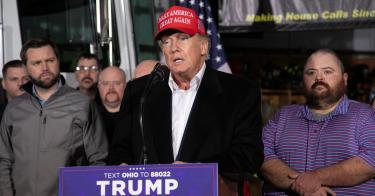EAST PALESTINE, Ohio—The Biden administration’s slow response to a Feb. 3 Norfolk Southern freight train derailment and subsequent ecological disaster will have long-range consequences for the residents of East Palestine and potential political consequences for the Democratic Party.
I learned this during a visit to the town last week, where I also documented former President Donald Trump’s visit to the city.
Here are seven key facts I learned firsthand from the residents of East Palestine.
1. The Derailment Is a Multistate Disaster
This train derailment was a multistate issue from the start because the derailment and controlled burn happened at the border of Ohio and Pennsylvania. East Palestine’s eastern border is also the Ohio-Pennsylvania border.
East Palestine is located near two major cities in two different states. Pittsburgh, Pennsylvania, with a population of 300,000, is approximately 40 miles northwest, and Youngstown, Ohio, with a population of 60,000, is roughly 20 miles south of the town.
Because of the multistate issues, there should have been a large federal response early in the disaster.
2. The City Still Smells of Chemicals
There was a profound chemical odor even though it was weeks later after the event.
When I first arrived in the city, there was a pungent chemical odor that you couldn’t escape. There was also another distinct, sweet chemical smell surrounding the waterways of East Palestine.
The closer you got to the water, especially the waterways that Norfolk Southern was aerating, the sweeter the chemical smell.
3. East Palestine Is a Vibrant Small Town
When I arrived in town, I was surprised at how relatively large it was. I was expecting a one-stoplight town with vacant storefronts, but it was the exact opposite.
Although the population is just 4,761, the town occupies a larger area than one might expect and spans 3.15 square miles.
This was a bustling small town. Many of the storefronts had businesses in them, and everyone appeared to be at work. Every business I stopped in was busy, and people were very cordial.
4. The Trump Effect
If it wasn’t for Donald Trump Jr.’s tweet on Feb. 17 announcing his father’s plan to visit the town, East Palestine likely would not have seen such a large presence from the Biden administration.
Four minutes after Trump Jr.’s tweet, the Federal Emergency Management Agency announced on Twitter it was sending a senior official and an Instant Management Assistance Team.
On Feb. 22, the Environmental Protection Agency announced plans to hold Norfolk Southern liable for the cleanup.
On Feb. 24, Transportation Secretary Pete Buttigieg visited the disaster site and stated on Twitter, “We’re constrained by law on some areas of rail regulation (like the braking rule withdrawn by the Trump administration in 2018 because of a law passed by Congress in 2015), but we are using the powers we do have to keep people safe.”
Buttigieg’s statement was fact-checked by the Washington Post, which concluded, “From our analysis, none of the regulatory changes made during the Trump administration at this point can be cited as contributing to the accident.”
Trump Jr.’s tweet undoubtedly forced the administration to respond in a larger way to this disaster.
5. Trump Fires Up the Town
Trump’s visit on Feb. 22 seemed to energize the entire town. Many of the residents of East Palestine are big fans of Trump and his former presidency.
6. FEMA’s Limited Presence
It didn’t appear that the FEMA personnel were interacting with the residents of East Palestine in any meaningful way. The agency’s only presence in town that I saw appeared to be two unmarked recreational vehicles.
From my observations, FEMA did not post any signage on or around its RVs or any other part of town to state its presence. Nor did it put up any booths on the sidewalk during Trump’s visit to the town. It didn’t appear that it was interacting with residents on the day I visited.
7. Federal Agencies Are Relying on Norfolk Southern
FEMA, the Environmental Protection Agency, and the Department of Transportation seemed to be solely relying on Norfolk Southern to respond to the disaster.
I did not see any EPA or Department of Transportation representatives, nor did I hear about any EPA, Transportation, or FEMA representatives contacting residents. I did see Norfolk Southern representatives giving cards out to employees of the local McDonalds.
This piece originally appeared in The Daily Signal



